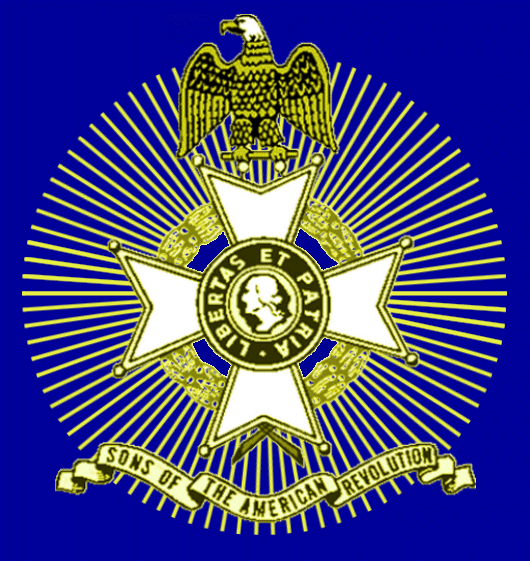Who We Are
The Sons of the American Revolution (SAR), and the Fairfax Resolves Chapter in particular, is a Service Organization dedicated to the Educational, Patriotic and Historic Purposes of our nation. We are a large Virginia Chapter with emphasis on community involvement.

Compatriot Paul Peak with the Fairfax Resolves Flag.
The Fairfax Resolves Chapter, Virginia Society, Sons of the American Revolution was formally established and the first officers installed on October 25th, 1979. The Chapter Charter was presented to those first officers in the oldest courtroom of the Fairfax County Courthouse, erected in 1800.
The name, Fairfax Resolves, was selected for the new chapter's name to honor the actions of the citizens of Fairfax County and the great resolutions that they unanimously approved at a public meeting chaired by George Washington at the Court House in the town of Alexandria on July 18th, 1774. The Fairfax Resolutions, known today as the Fairfax Resolves, was the strongest documented stand against British oppression to be formally and officially stated by a group of citizens up to this time in America.
![]()
The American Revolution
Fairfax Resolves
(From www.u-s-history.com)

George Mason - One author of the Fairfax Resolves
The seemingly more genteel Southern colonies had long regarded Massachusetts as the home of sharp Yankee traders, sanctimonious religious zealots and intemperate political radicals. Those perceptions were changed in early 1774 when Parliament began imposing the Coercive Acts as punishment for the Boston Tea Party and other acts of defiance. With the Bay Colony singled out for stern treatment, many of its neighbors adopted a much more sympathetic view. One such response occurred in Virginia. On July 17, 1774, George Mason and Patrick Henry visited George Washington at Mount Vernon to discuss the emerging American plight. A statement was drafted, largely the work of Mason, that became known as the Fairfax Resolves.
This short document provided the following:
• A concise summary of American constitutional concerns on such issues as taxation, representation, judicial power, military matters and the colonial economy,
• A proposal for the creation of a nonimportation effort to be levied against British goods,
• A call for a general congress of the colonies to convene for the purpose of preserving the Americans’ rights as Englishmen,
• A condemnation of the practice of importing slaves as an “unnatural trade;” its termination was urged,
• A veiled threat was aired in the reminder that the colonists were “Descendants not of the Conquered, but of the Conquerors.”
On the following day, July 18, the Resolves were endorsed by a Fairfax County convention, a public protest meeting staged at the local courthouse with Washington presiding. In short order the resolutions were taken on to the House of Burgesses and the Continental Congress. The Fairfax Resolves summarized the feelings of many colonists in mid-1774 — a conviction that their constitutional rights were being violated by British policies, but no mention of independence was made and only a hint of support for armed resistance was offered. The Resolves also marked a step forward in inter-colonial cooperation as more Americans began to realize that a threat against one colony was a threat against all. Finally, political rivalries in Virginia were muted to some degree, allowing such figures as Washington and Mason to work productively with the more radical Henry, Richard Henry Lee and others.
Read a transcript of the Fairfax Resolves document

